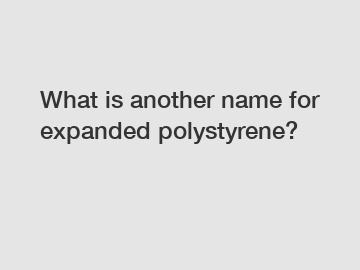Jan. 04, 2024
Machinery
What is another name for expanded polystyrene?
Points discussed in this article:
2. The various names used for expanded polystyrene.

3. The importance of expanded polystyrene in different industries.
4. Environmental concerns and alternatives to expanded polystyrene.
5. Conclusion highlighting the significance of expanded polystyrene in modern applications.
Expanded polystyrene (EPS), a lightweight and versatile material, is widely used across various industries. Also known by several different names, EPS serves as a valuable component in numerous applications. Let's delve deeper into the several names for expanded polystyrene and explore its significance in today's world.
Expanded polystyrene, commonly referred to as EPS, is a thermoplastic material that is formed by expanding polystyrene beads. Due to its unique properties, EPS exhibits excellent insulation, cushioning, and lightweight characteristics, making it ideal for a wide range of applications. Now let's explore the different names given to this versatile material.
1. Foam or Styrofoam:
One of the most well-known names for expanded polystyrene is foam. EPS foam is primarily used in packaging materials, including protective packaging for delicate items, insulating foam boards, and foam components in construction projects. Its extremely lightweight nature and shock-absorbing properties make it perfect for these applications. Another common term used synonymously with EPS foam is "Styrofoam," which is actually a registered trademark of The Dow Chemical Company. However, due to its widespread use, it has become a generic term for foam packaging materials.
2. White Beadboard:
Another frequently used name for expanded polystyrene is white beadboard. This refers to the appearance of EPS in its raw form, which consists of small white beads. These beads can then be molded, heated, and expanded to form rigid foam boards or other EPS products.
3. Airpop:
EPS is also commonly referred to as airpop. This name highlights the material's unique ability to form closed cells filled with air during its expansion process. These air-filled cells contribute to EPS's excellent thermal and acoustic insulation properties.
4. Insulation Board/Sheathing:
In the construction industry, expanded polystyrene is widely recognized as an insulation board or sheathing. EPS insulation boards are used to improve energy efficiency in buildings, helping to reduce heat transfer and optimize thermal performance. The strength and durability of EPS make it a popular choice for insulating roofs, walls, and floors, thereby reducing energy consumption and promoting sustainable building practices.
The importance and versatility of expanded polystyrene cannot be overstated. It plays a vital role in various industries, including:
1. Packaging:
EPS is employed extensively in packaging applications across numerous industries. Its lightweight yet robust nature provides excellent protection for fragile items during transportation. The material's cushioning properties allow it to absorb shocks and impacts, ensuring product safety. From electronics to consumer goods, EPS packaging is prevalent due to its affordability, accessibility, and effectiveness.
2. Food and Beverage Industry:
Expanded polystyrene is widely used in the food and beverage industry due to its excellent insulation capabilities. EPS foam is often used to produce containers, cups, and trays for food packaging. Its thermal insulation keeps food at the desired temperature, preventing heat loss or gain during storage and transportation. Additionally, the lightweight and customizable nature of EPS allows for easy transportation while maintaining the quality of perishable goods.
3. Construction and Infrastructure:
The construction industry relies on expanded polystyrene for its insulation properties. EPS boards are used as insulating materials in buildings, ensuring enhanced thermal performance, reduced energy consumption, and improved comfort levels for inhabitants. Furthermore, EPS is frequently used as void fill material, lightweight fill material, and geotechnical solutions, proving its adaptability and reliability.
While expanded polystyrene offers various benefits, it has also faced scrutiny due to environmental concerns. EPS is not biodegradable and can take hundreds of years to decompose, contributing to environmental pollution. However, innovative recycling initiatives have been introduced to tackle this issue. Recycling facilities can transform post-consumer EPS waste into new products, reducing its impact on the environment.
In recent years, alternative materials to expanded polystyrene have gained traction, including biodegradable and bio-based substitutes. These environmentally friendly alternatives aim to reduce the environmental impact associated with traditional EPS while providing similar functionalities. The development and adoption of such alternatives will mitigate the concerns surrounding EPS waste disposal over time.
In conclusion, expanded polystyrene, known by a variety of names such as foam, Styrofoam, beadboard, and airpop, is a versatile material extensively used across industries. Its lightweight, insulation properties, and shock-absorbing capabilities make it an ideal choice for packaging, construction, and food industries. While environmental concerns have prompted the exploration of alternative materials, EPS continues to be a vital component in various applications. As technology and environmental consciousness evolve, the industry must continue to innovate and strike a balance between the functionality of EPS and its impact on the environment.
Want more information on epe foam extrusion machine supplier, EPS Shape Moulding Machine, EPE foam machines supplier? Feel free to contact us.
If you are interested in sending in a Guest Blogger Submission,welcome to write for us!
All Comments ( 0 )